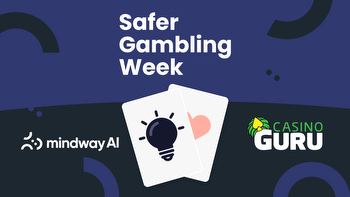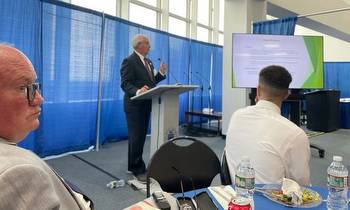Industry Insiders Make Responsible Gambling Predictions For 2024

This past summer, a youth soccer team from the Pacific Northwest traveled to Europe to play some friendlies. This team had dominated its league back home, and it understandably took the pitch on the old continent brimming with confidence.
That balloon of self-assurance was quickly deflated when the U.S. team got smoked, game after game. The Europeans were simply more skilled, seasoned, and cohesive, providing the American youngsters with a roadmap for how far they still had to go.
A similar dynamic on Thursday infiltrated Mindway AI’s “Predictions in Responsible Gambling for 2024” webinar, which featured a lone U.S. panelist, the problem and responsible gambling consultant Brianne Doura-Schawohl. She shrewdly acknowledged the “woefully uneducated” state of the American responsible gambling landscape relative to its counterparts across the pond.
“Here in the U.S., our federal government doesn’t even recognize gambling addiction,” she said. “We only have two jurisdictions who fine the industry for violations around RG. We’re in a very different position from the rest of you right now.”
Indeed, as noted by Dan Spencer, a recovering gambling addict who is now the director of safer gambling for EPIC Global Solutions, virtually every major gambling operator in the U.K. has been fined recently by the federal regulatory authority there. Spencer predicted that this punitive trend would continue in 2024 if effective human intervention didn’t follow the automated detection of at-risk and problem gamblers on various platforms by service providers like Mindway AI, a Denmark-based company owned by Better Collective (which is also US Bets’ parent company).
“If the interaction isn’t good enough, the detection systems won’t have an impact,” said Spencer, whose 2024 forecast included increased responsible gambling auditing of operators by foreign regulatory entities like the Malta Gaming Authority.
‘Non-friction interactions’ the way to go
For as effective as artificial intelligence can be in detecting red flags among online gamblers, panelist Mike de Graaff, BetComply’s director and chief compliance officer, lamented that C-suite gambling executives “don’t understand the AI fully,” adding that “most tech people don’t even understand it.”
“The main objective for providers would be to have it be explainable — ‘What is happening with these algorithms?’” he said. “Their immediate thought will be, ‘We will be restricting the players we shouldn’t be restricting.’”
“Most of what you said, Mike, is one of the reasons why we invented the approach where we combine machine-learning algorithms with human psychology assessments,” replied Mindway AI CEO Rasmus Kjaergaard, noting that his company gathers information from some 150 data points per player. “We wanted to do the detection of the gambling behavior more thoroughly and more individualized.”
Kjaergaard acknowledged the importance of not restricting “the 97% of players who don’t” show problematic gambling behavior, while Doura-Schawohl said it was up to the industry to assure decision makers that the implementation of responsible and problem gambling tools would lead to a more sustainable customer base rather than costing them players.
“I often advise my clients to offer these RG tools at the time of signup,” said Doura-Schawohl, who conceded that it might take two or three years for that to become the industry standard.
For this to happen, de Graaff said more automated player verification would need to occur, noting that “every click you add to the registration flow” leads to fewer signups.
“For North America, the number one focus is customer acquisition,” said Spencer. “I think background interventions like Mindway provides, non-friction interactions, is gonna be the way to go.”
Single customer view ‘worrisome’ to U.S.
Further illustrating the gulf in maturity between the U.S. and established foreign markets, there was a fair amount of discussion involving single customer view, which gives operators information about a gambler’s activity across rival platforms.
Whereas single customer view is quickly becoming the standard in many foreign jurisdictions, Doura-Schawohl pointed out that “in the U.S., from a data privacy standpoint, this is very worrisome.”
“We only have one state, and that’d be New Jersey, that indicates what type of markers for harm should be intervened,” she added. “There’s going to have to be a lot of self-driven initiative, as our legislation lags significantly behind.”
Doura-Schawohl went on to highlight another massive difference in America’s gambling evolution, explaining that while European countries are in the process of undoing “long-existing relationships” between pro sports and gambling entities, the opposite effect has taken hold in the U.S.
“In North Carolina, all market access is being driven by partnerships with professional sports teams,” she said. “The truth is, several of those leagues and teams have been very aggressive talking about RG. … From my perspective, I actually see an opportunity for the leagues and teams to join in and educate and normalize responsible gaming.”






































